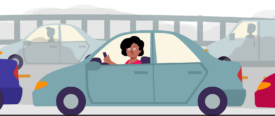 A tip of the hat to Richard Conniff, whose New York Times op-ed today is a refreshing foil to all those “death and taxes” commentaries you’ll hear all day long on April 15. Conniff suggests that we’d all be better off shedding the “ugliest word in the English language, right up there with its evil twin, ‘death.'” And instead, we should start talking about paying our “dues.”
A tip of the hat to Richard Conniff, whose New York Times op-ed today is a refreshing foil to all those “death and taxes” commentaries you’ll hear all day long on April 15. Conniff suggests that we’d all be better off shedding the “ugliest word in the English language, right up there with its evil twin, ‘death.'” And instead, we should start talking about paying our “dues.”
The word “dues” doesn’t carry all the negative baggage that the “T-word” does. And dues might better signify a meaningful contribution to a joint effort, membership in a functioning society. Conniff writes:
…the word “dues” also plays into the psychology of group identity, and that can work to the benefit of conservatives and liberals alike. Consider that “tax” comes from the Latin for “appraise” with punitive overtones of “censure” or “fault,” as if wage-earners have done something wrong by their labors. “Dues,” in contrast, is rooted in social obligation and duty.
A word shift certainly wouldn’t change our thinking overnight – even if we could all agree to stop saying “taxes.” But it’s good to remember that our lives are enriched, supported, and protected by the public structures that we create and maintain to sustain our quality of life.
Think of libraries, police officers, schools, swimming pools, fire stations, garbage collection, courts, and freeways. It doesn’t mean nobody slips through the cracks or that some taxes don’t go toward expenditures we might not approve of. But, as Conniff points out, “we thrive because of the schools and transit systems and 10,000 other services that exist only because we have joined together.”
Instead of denouncing taxes, politicians would do better to appeal to the patriotic corners of our hearts that warm to phrases like “we the people.” “Taxation” is a throwback to the time when kings picked our pockets. “Paying my dues,” a phrase popularized in the jazz music world, is language by which we can stand together as Americans.
As we file our income tax forms, the concept of paying dues works because it reminds us that however villainized the IRS has become, it’s not “us against them,” it’s just us. We are members of the club, we live in the clubhouse. We are the club.
Illustration courtesy Matthew Bandsuch.









Matt the Engineer
How about I call the black part of this chart “dues” and the red part “taxes”? I’m happy to pay my dues. (no I haven’t looked into the numbers from that link, and wouldn’t be surprised if they were a touch biased)Of course most of the “libraries, police officers, schools, swimming pools, fire stations, garbage collection, courts, and freeways” I use don’t come from income tax, but I’m happy to pay those dues as well.
Andrew E
Matt, if you don’t want to pay war taxes, what’s to stop someone from saying: “I don’t want to pay school taxes because I don’t have children and I think the money could be better spent on the military.”OK, no one would say exactly that, but my point is that if you can choose, then so can everyone else.
Matt the Engineer
Oh, I paid them. I’m just not happy about it.
Anna Fahey
I agree. This is a bit troubling:”Joseph E. Stiglitz and Linda J. Bilmes note in The Three Trillion Dollar War,” each American household is spending approximately $100 each month toward the “current operating costs” of the Iraq war (p. 138).”
SLC
I saw this this other day– visual representation of our federal gov. by this guy names Jess Bachman. It’s very cool: http://www.wallstats.com/deathandtaxes/